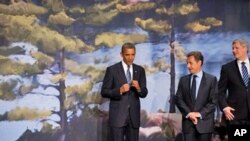World leaders in the Group of Eight (G8) have concluded their summit in Canada with a communique saying the global economy is at an important crossroads, with the world still at the beginning of a fragile recovery from economic crisis. G8 leaders now taking part in the wider G20 summit, also criticize Iran and North Korea over their nuclear programs, and address the situation in Afghanistan.
The 43 point communique says G8 nations are bound together by a shared vision on major challenges, and the group has demonstrated the capacity to design credible approaches to meet global challenges.
The statement addresses a range of development and aid issues, along with trade, and environmental issues. It does not contain any broad statement about how countries will pursue economic recovery, saying progress will be made by the G20 toward sustainable recovery of the global economic and financial system.
G8 leaders express concern about serious threats to global peace and security, from the proliferation of weapons of mass destruction, terrorism, organized crime, piracy and political and ethnic conflict.
They condemn the sinking of the South Korean warship this past March that an international investigation said was carried out by North Korea.
Iran and North Korea come in for specific criticism over their nuclear programs. Urging full implementation of the new U.N. Security Council resolution imposing new sanctions, the G-8 calls on Iran to engage in a transparent dialogue about its nuclear activities and meet is international obligations.
Canadian Prime Minister Stephen Harper spoke earlier about the G8's position. "The governments of Iran and North Korea have chosen to acquire weapons to threaten their neighbors. The world must see to it that what they spend on these weapons will not be the only cost that they incur," he said.
The G8 also urges Iran to respect the rule of law and freedom of expression, language that mirrors a communique from a previous G8 summit.
The G8 calls on Afghanistan to demonstrate tangible progress toward assuming increasing responsibility for security within five years, saying a conference in Kabul in July would be an important opportunity to detail such plans.
President Barack Obama said he and British Prime Minister David Cameron had extensive discussions on Afghanistan, telling reporters the right strategy is in place to provide the Afghan government to build its military capacity over the coming months and years. The president spoke after those talks. "On foreign policy issues the United States and the United Kingdom are not only aligned in theory, but are aligned in fact," he said.
On global economic issues, Canadian Prime Minister Harper said all G8 leaders share concerns about the need to avoid a repeat of risks, and events, that led to the 2008 financial crisis.
U.S. Treasury Secretary Tim Geithner spoke of G8 nations having to find the right balance between growth and deficit reduction as they work to repair damage from the financial crisis. "We are going to take the steps necessary to bring down our deficits over time. But we also have to make sure we are growing. We have to find the right balance, and that balance is going to differ across countries," he said.
The focus now shifts to the G20 summit, which includes the G8 members United States, Canada, Britain, France, Germany, Italy, Japan and Russia plus major developing economic powers such as China, India and Brazil.
As the G20 summit got underway, protesters faced off with police in Toronto. Some protesters hurled bottles at police, and broke windows on several storefronts. At least one police car was set afire.
G8 Urges More Work on Global Economy, Criticizes Iran, North Korea








